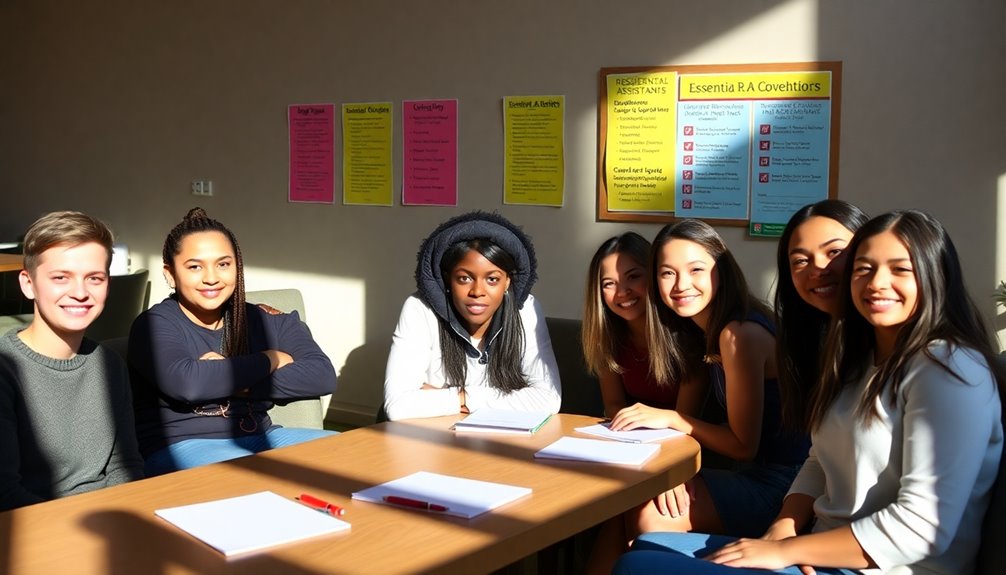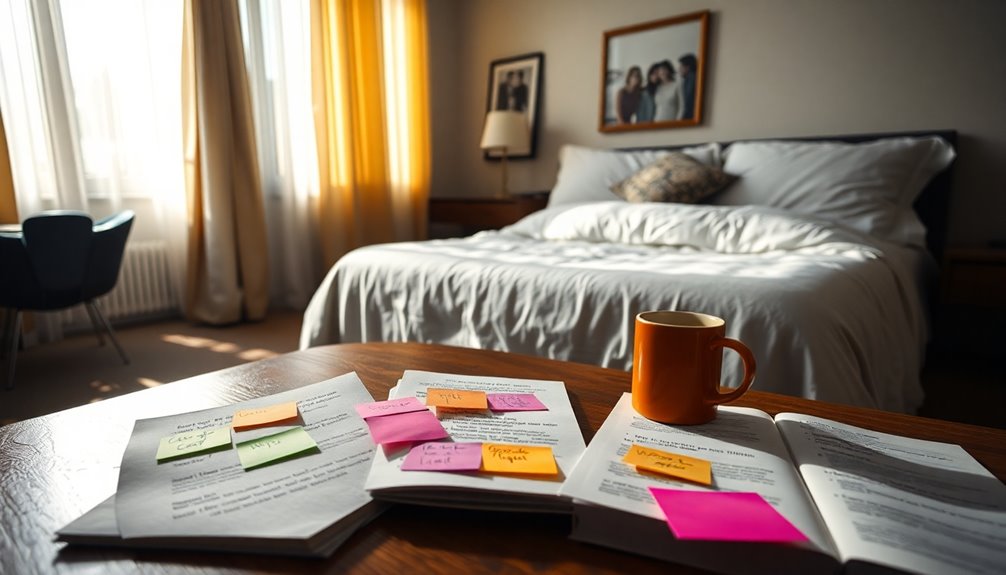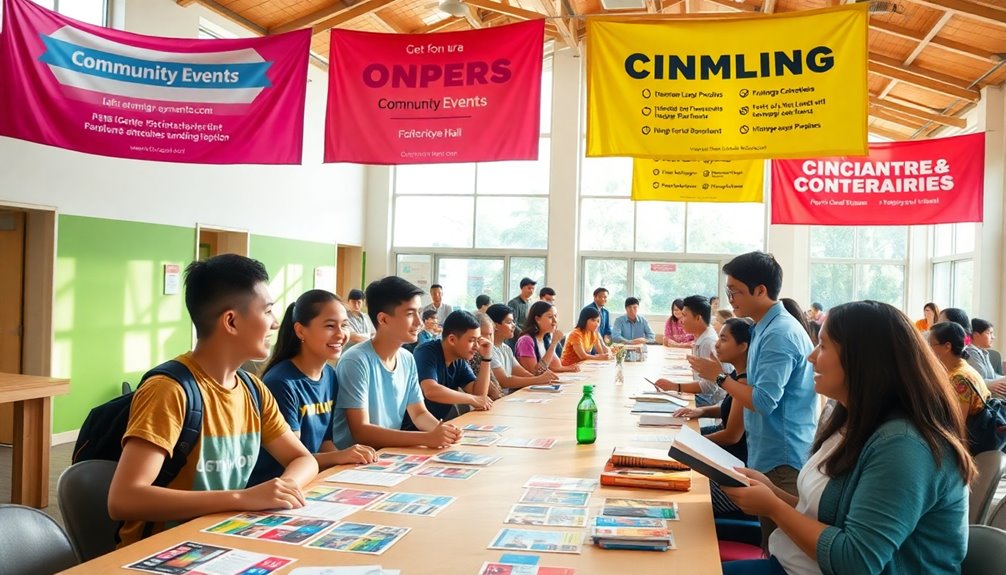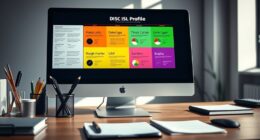When preparing for a Resident Assistant interview, you'll face several vital questions. You'll be asked about your experience and motivation for applying. Expect to discuss how you'd handle community-building events and foster relationships among residents. Prepare to address emergency preparedness and your strategies for conflict resolution. Employers want to know how you support academic and mental health needs within the community. Don't forget to highlight your personal qualities. All these topics give insight into your approach as an RA. For more essential insights and tips, there's plenty more to explore on the topic.
Key Takeaways
- Discuss your motivation for applying for the RA position and how you discovered it to show genuine interest.
- Be prepared to highlight your best qualities and acknowledge any perceived flaws for self-awareness.
- Share experiences of challenges faced in previous roles, focusing on solutions implemented to overcome them.
- Express your preference for teamwork versus solo work to align with the community-building aspect of the RA role.
- Prepare thoughtful questions about team dynamics and professional development opportunities to demonstrate engagement.
General Interview Questions

When preparing for a Resident Assistant (RA) interview, you can expect a range of general questions designed to assess your fit for the role. You might be asked how you discovered the RA position, which helps interviewers gauge your motivation.
They'll likely want to know your best personal qualities and any flaws you perceive in yourself. Be ready to clarify your general availability and share interests outside of work, as these insights can reveal your balance and personality.
Asking thoughtful questions is essential; it shows your interest in the role and helps you understand expectations. Don't hesitate to inquire about team dynamics and professional development opportunities available to RAs, as these factors greatly impact your experience.
Experience and Background

Your experience and background play an essential role in shaping your suitability for the Resident Assistant (RA) position. Interviewers want to understand how your past experiences can contribute to your effectiveness as an RA.
Consider highlighting the following aspects:
- Challenges you've faced: Describe a significant work challenge and how you overcame it.
- Work schedule: Share your typical job hours and how you managed responsibilities.
- Teamwork vs. solo work: Express your preference and effectiveness in collaborative environments.
- Career goals: Outline your professional aspirations and how this role aligns with them.
These elements not only showcase your qualifications but also demonstrate your readiness to take on the responsibilities of an RA.
Be prepared to discuss these topics in detail during your interview.
Role-Specific Inquiries

Role-specific inquiries are essential for understanding how well you can navigate the unique challenges of being a Resident Assistant (RA). You'll likely face questions about your approach to community building, rule enforcement, and conflict resolution. Here's a table that highlights some key aspects to reflect upon:
| Inquiry | Consideration |
|---|---|
| How would you implement hall rules? | Think about strategies that promote compliance. |
| How do you handle non-compliant students? | Discuss your approach to conflict resolution. |
| What's your plan for enhancing inclusivity? | Share ideas for creating a welcoming environment. |
These inquiries not only gauge your understanding of the RA role but also reveal your commitment to fostering a supportive community. Be prepared to showcase your skills and insights! Understanding emotional and social impact during challenging situations can also help you connect with residents more effectively.
Emergency Situation Preparedness

Understanding the dynamics of community building and conflict resolution sets a solid foundation for your responsibilities as a Resident Assistant (RA).
When emergencies arise, your preparedness can make all the difference. You'll need to stay calm and act swiftly.
Here are key elements to keep in mind:
- Familiarize yourself with emergency protocols and procedures.
- Conduct drills and training sessions for residents.
- Serve as a point of contact during crises.
- Communicate effectively with supervisors and authorities.
- Being aware of environmental factors can help you assess potential risks within your community.
Essential RA Qualities

A successful Resident Assistant (RA) embodies a unique blend of qualities that foster a positive living environment. You need strong communication skills to connect with residents, guaranteeing they feel heard and valued.
Leadership is essential—you must guide your peers and set a tone for community engagement. Being adaptable helps you navigate diverse situations and personalities effectively.
Empathy allows you to understand your residents' experiences, making it easier to support them. Additionally, self-awareness is important; recognizing your strengths and weaknesses will help you grow in the role.
Finally, having a proactive approach guarantees you anticipate challenges and address them before they escalate. Embracing these qualities will empower you to become an effective and respected RA.
Building Student Relationships

Building strong relationships with students is essential for creating a supportive and inclusive residence hall environment. As an RA, you'll want to focus on fostering trust and open communication.
Here are some strategies to help you connect with residents:
- Introduce yourself to all students: Make sure everyone knows who you're and feels comfortable approaching you.
- Be transparent and open-minded: Encourage residents to share their thoughts and concerns without fear of judgment.
- Engage in regular check-ins: Actively listen to residents' experiences and needs to build rapport.
- Create a welcoming atmosphere: Organize events that encourage interaction and collaboration among students.
Conflict Resolution Techniques

Conflict can arise in any community, including residence halls, often stemming from misunderstandings or differing perspectives among residents. To effectively resolve these issues, you'll need to employ various techniques. Start with private discussions to allow residents to express their feelings. Encourage open communication to identify root problems. Collaboration is key—work with the involved parties to develop solutions together. Follow up to guarantee lasting harmony and utilize active listening to truly understand their concerns. Here's a quick reference table for effective conflict resolution strategies:
| Technique | Description | Benefits |
|---|---|---|
| Private Discussions | One-on-one talks with involved parties | Reduces defensiveness |
| Open Communication | Encourage sharing thoughts openly | Builds trust and understanding |
| Collaborative Solutions | Work together on resolving issues | Fosters teamwork |
| Follow-Up | Check in after resolution | Guarantees ongoing harmony |
Supporting Homesick Residents

Many residents experience homesickness, especially during their shift to college life.
As an RA, you can play a crucial role in helping them adjust. Here are some effective strategies to support homesick residents:
- Practice empathy: Listen actively and validate their feelings without judgment.
- Encourage connections: Suggest they reach out to family and friends or make new friends in the dorm.
- Promote involvement: Invite them to participate in community activities to foster a sense of belonging.
- Follow up: Check in regularly to see how they're doing and offer ongoing support.
Engaging Community Events

Supporting residents dealing with homesickness is just one aspect of creating a vibrant community. Engaging community events play an essential role in fostering connections among residents.
As an RA, you'll want to plan inclusive activities that cater to diverse interests, ensuring everyone feels welcome. Think about hosting game nights, movie screenings, or themed dinners that encourage participation.
It's important to gather feedback from residents to improve future events and keep everyone engaged. Collaborate with your peers to brainstorm creative ideas and utilize campus resources. Additionally, incorporating elements of music, such as music therapy for autism, can enhance engagement and emotional connection among residents.
By prioritizing community events, you'll help residents build friendships and create lasting memories, ultimately enhancing the overall living experience.
Academic and Mental Health Support

Balancing academic demands with mental health needs is essential for residents' overall well-being.
As an RA, you play a significant role in supporting both aspects. You'll need to foster an environment where residents feel comfortable discussing their struggles and seeking help.
Here's how you can provide effective academic and mental health support:
- Share resources like tutoring services and mental health hotlines.
- Organize study sessions to help residents manage their workload.
- Encourage open conversations about mental health to reduce stigma.
- Promote self-care activities such as workshops on stress management.
Frequently Asked Questions
How Do You Handle Differing Opinions Among Team Members?
When you encounter differing opinions among team members, you should encourage open dialogue.
Invite each person to share their perspectives, ensuring everyone feels heard. You can facilitate a discussion to identify common goals and potential compromises.
By focusing on collaboration, you help the team move forward together.
It's crucial to remain calm and respectful throughout the process, as this fosters a positive environment where diverse opinions can lead to better solutions.
What Strategies Do You Use to Promote Diversity and Inclusion?
Imagine a vibrant tapestry, each thread representing a unique voice.
To promote diversity and inclusion, you foster open dialogue, encouraging residents to share their stories and perspectives. You organize events celebrating various cultures, creating a welcoming space where everyone feels valued.
How Do You Prioritize Tasks During Busy Periods?
When you're juggling multiple tasks during busy periods, it's crucial to prioritize effectively.
Start by listing all your responsibilities and identifying urgent tasks. Use a system, like the Eisenhower Matrix, to categorize each task by urgency and importance.
Focus on high-priority items first, and don't hesitate to delegate or ask for help when needed.
Regularly reassess your priorities to stay on track and guarantee you meet deadlines efficiently.
Can You Provide an Example of a Successful Program You Organized?
Imagine planting a garden where every flower represents a resident's unique interests.
You organized a "Cultural Night," inviting residents to share their heritage through food, music, and stories. This event bloomed into a vibrant tapestry of cultures, fostering connections and celebrating diversity.
You noticed everyone engaged, laughing, and sharing, turning strangers into friends.
It wasn't just a program; it was a nurturing space that cultivated community spirit and understanding among residents.
What Role Do You Think Social Media Plays in Community Building?
Social media plays an essential role in community building. You can use platforms like Instagram or Facebook to share events, foster connections, and create a sense of belonging among residents.
Conclusion
To sum up, preparing for your RA interview is crucial for success. Did you know that RAs contribute to a 50% increase in student retention rates? This highlights the significance of your role in creating a supportive community. By reflecting on the key questions and showcasing your leadership and empathy, you can position yourself as the ideal candidate. So, take the time to practice your responses and demonstrate how you can make a positive impact on residents' lives.
Eugene brings a fresh, dynamic voice to our platform as one of our talented Writers. Specializing in research-driven content, he explores the latest findings in psychology and personal growth, translating them into actionable insights for our readers. Eugene’s work is fueled by a curiosity about what makes us tick and a desire to help others unlock their potential.










